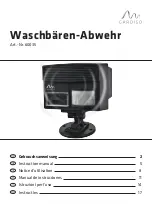
1. Unwanted operation of differential (i.e. unit) protections for external faults
2. Unacceptably delayed or even missing operation of all types of protections (for
example, distance, differential, overcurrent, etc.) which can result in loosing
protection selectivity in the network
No information is available about how frequent the use of the new iron core
material is for protection CT cores, but it is known that some CT manufacturers are
using the new material while other manufacturers continue to use the old traditional
core material for protection CT cores. In a case where VHR type CTs have been
already installed, the calculated values of E
al
for HR type CTs, for which the
formulas are given in this document, must be multiplied by factor two-and-a-half in
order for VHR type CTs (i.e. with new material) to be used together with ABB
protection IEDs. However, this may result in unacceptably big CT cores, which can
be difficult to manufacture and fit in available space.
Different standards and classes specify the saturation e.m.f. in different ways but it
is possible to approximately compare values from different classes. The rated
equivalent limiting secondary e.m.f. E
al
according to the IEC 61869–2 standard is
used to specify the CT requirements for the IED. The requirements are also
specified according to other standards.
16.1.2
Conditions
M11610-3 v1
M11610-4 v4
The requirements are a result of investigations performed in our network simulator.
The current transformer models are representative for current transformers of high
remanence and low remanence type. The results may not always be valid for non
remanence type CTs (TPZ).
The performances of the protection functions have been checked in the range from
symmetrical to fully asymmetrical fault currents. Primary time constants of at least
120 ms have been considered at the tests. The current requirements below are thus
applicable both for symmetrical and asymmetrical fault currents.
Depending on the protection function phase-to-earth, phase-to-phase and three-
phase faults have been tested for different relevant fault positions for example,
close in forward and reverse faults, zone 1 reach faults, internal and external faults.
The dependability and security of the protection was verified by checking for
example, time delays, unwanted operations, directionality, overreach and stability.
The remanence in the current transformer core can cause unwanted operations or
minor additional time delays for some protection functions. As unwanted
operations are not acceptable at all maximum remanence has been considered for
fault cases critical for the security, for example, faults in reverse direction and
external faults. Because of the almost negligible risk of additional time delays and
the non-existent risk of failure to operate the remanence have not been considered
for the dependability cases. The requirements below are therefore fully valid for all
normal applications.
1MRK 511 423-UEN A
Section 16
Requirements
Bay control REC650 2.2 IEC
293
Application manual
















































